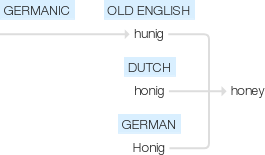Honey
Old English hunig, of Germanic origin; related to Dutch honig and German Honig .
wiktionary
From Middle English hony, honi, from Old English huniġ, from Proto-West Germanic *hunag, from Proto-Germanic *hunagą (compare West Frisian hunich, German Honig), from earlier *hunangą (compare Swedish honung), from Proto-Indo-European*kn̥h₂onk-o-s, from *kn̥h₂ónks. Cognate with Middle Welsh canecon(“gold”), Latin canicaepl(“bran”), Tocharian B kronkśe(“bee”), Albanian qengjë(“beehive”), Ancient Greek κνῆκος(knêkos, “safflower”), Northern Kurdish şan(“beehive”), Northern Luri گونج (gonj, “Bee”).
etymonline
honey (n.)
Middle English hony, from Old English hunig "honey," from Proto-Germanic *hunang- (source also of Old Norse hunang, Swedish honung, Old Saxon honeg, Old Frisian hunig, Middle Dutch honich, Dutch honig, Old High German honang, German Honig "honey"), of uncertain origin. Perhaps from a PIE *k(e)neko- denoting yellow, golden, or brownish colors (compare Sanskrit kancan- "golden," Welsh canecon "gold," Greek knēkos "yellowish"), or perhaps from a substratum word. Finnish hunaja is a Germanic loan-word.
The more common Indo-European word is represented in Germanic by the Gothic word for "honey," miliþ (from PIE root *melit- "honey"). A term of endearment from at least mid-14c.; extended form honey-bunch attested by 1904. Meaning "anything good of its kind" is 1888, American English. Honey-locust, North American tree, so called from 1743, said to be named from a sweet pulp made by Native Americans from the tree's beans.
honey (v.)
"to sweeten, cover with honey," mid-14c., from honey (n.). Related: Honeyed; honeying.
